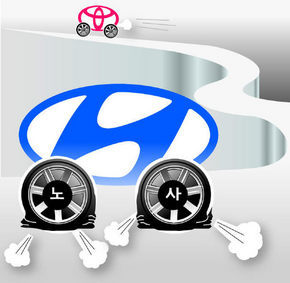Posted on : Jan.8,2007 14:39 KST
Modified on : Jan.9,2007 13:31 KST
Hyundai Motor Co. has been hit with a labor-management dispute stemming from a group of unionists dissatisfied with their year-end bonuses.
This December, the company shaved 2005’s year-end bonus by half. In reaction, the company’s union has urged workers to reject any overtime work since December 27, and union members disrupted the company’s New Year’s event on January 3. In response, the company on the same day filed a criminal lawsuit against 26 union officials for leading the New Year’s disruption, and five days later filed a suit against the union on a whole, demanding 1 billion won (US$1.06 million) in restitution for damages for the overtime strike. In turn, the union plans to hold a protest in front of the company’s Seoul headquarters on January 10.
Observers aware of the realities at Hyundai Motor say that this is not the time to argue which side is right and which is wrong. The nation’s flagship company is in a crisis, reaching from the very bottom up to the top echelon of management, they say.
South Koreans are proud of the fact that Hyundai Motor is ranked the sixth-largest automaker in the world, but its productivity is about 60 percent of Toyota’s and lower than that of Beijing Hyundai, its affiliate. Toyota’s operating profit exceeded 14 trillion won last year and its annual profit has surpassed US$10 billion five times since 2001. Hyundai’s operating profit was estimated to be about 1.3 trillion won last year.
The world’s automakers, Hyundai included, have attempted to imitate Toyota’s methods of production, only to fail. Their inability is due to the fact that they cannot recreate Toyota’s employee loyalty, nor its labor-management cooperation and culture of trust between the two. People find it surprising that Toyota has been free from strikes for over 50 years and the company has posted a year-on-year surplus, but they take no notice that these accomplishments are possible due to the company’s management philosophy of respecting its workers. Toyota has not performed large-scale restructuring in more than five decades. While its regulations do not include an article regarding employment security, there is no job uncertainty felt there. In 1998, when U.S. credit ratings agency Moody’s warned that it would downgrade Toyota’s credit rating, taking issue with the company’s seeming guarantee of employment for life for its workers, then-president Hiroshi Okuda said, "A manager who cuts down personnel should disembowel himself."
In South Korea, a company head that hesitates to lay off his staff when the firm is faced with financial difficulty is considered "incompetent" and immediately fired. It is thus natural that labor’s attitude is different according to which company they work for: a firm whose manager will keep their jobs intact even at risk of his own position, or a firm whose manager reduces staff whenever the company is in trouble.
Workers at Hyundai Motor receive relatively high salaries, but they stick to earning short-term profit rather than following the company’s vision to become one of the global top five, due to labor-management distrust.
Under such circumstances, Hyundai Motor cannot make strides in anything requiring labor-management cooperation. The two agree on the shift system in order to preserve wages and to increase production, but they could not reach an agreement on this shift system at Hyundai’s Jeonju factory, for example. There has also been no progress in constructing an additional factory in Ulsan due to a dispute between labor and management surrounding the provision of a parking lot.
Both sides should take responsibility regarding this labor-management distrust. An executive of Hyundai Motor, asking to remain anonymous, pointed out, "The company has never admitted the labor union as its true partner, while the union has never make concessions for the common interest." While Chung Mong-koo, chairman of Hyundai Automotive Group, mentioned labor-management unity in a New Year’s speech, the company line is that ‘the labor union should change first.’ Unsurprisingly, the union insists that it should be the other way around.
Hyundai Motor’s crisis is not limited to that company alone; numerous South Korean firms are without trust between labor and management. In this respect, the crisis at Hyundai Motor is but a mirror of the crisis faced by the nation’s economy.
Please direct questions or comments to [englishhani@hani.co.kr]

